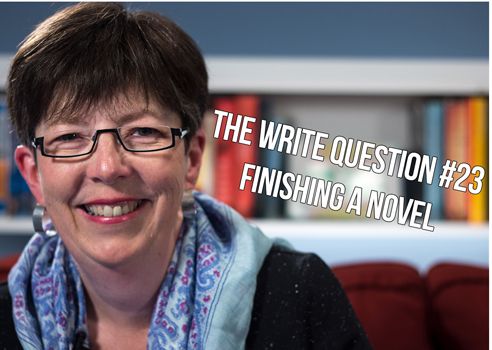Viewing time: 3 minutes and 29 seconds
The Write Question is a weekly video podcast about writing that I started in 2017 and that ran, more or less weekly, until April 2022. This is a republication of issue #23, addressing how to end a novel. The post first ran on July 7/17.
Transcript:
Welcome to The Write Question, the video podcast designed to answer your questions about writing. I’m Daphne Gray-Grant.
Today I’m answering a question from Mary Anne Revolinski who lives in Milwaukee, Wisconsin. Here’s her question.
[recording] “I’m working on this novel and I’m getting so close the the end, and frankly, I’m just struggling right now. I’m not happy with anything that I have written yet to wrap up the story, and I’m tempted to stop for the moment with just a sketch of the ending and sit with it. And I’m not sure how this part fits with the editing that I know is ahead of me. So I’m looking for suggestions.”
Thanks for the question, Mary Anne. Have you ever had a word on the tip-of-your-tongue where you couldn’t retrieve it but you had the strong feeling that it was there — just outside of your grasp.
Or maybe you’ve had the experience of not remembering someone’s name. No matter how hard you think, nothing seems to help. Then, many hours later — long after that person has left the room — his or her name suddenly pops into your mind.
Here is what experts say about tip-of-the-tongue and I suggest the same principles apply to trying to figure out an ending for your novel.
The most important thing is not to panic.
“You’ll compound tip-of-the-tongue by feeling anxious or nervous that you can’t remember the word,” says Alan Shepard, a neurologist at Northwestern Memorial Hospital in Chicago. That panicky feeling can send your brain into fight-or-flight mode, leaving it unable to concentrate.
One often-successful trick for remembering information is to put the problem out of your mind, according to Caroline Racine, a professor of neurological surgery. “Focusing on the fact that you can’t remember the word stresses out your brain,” Racine says, “and doesn’t let areas in your brain return to their normal state.” When you let go of the search and start to focus on something else, the word will often pop into your head.
The same thing applies to coming up with an ending for your novel. You don’t want it to sound forced or phoney, so relax. Let the idea come to you in its own good time. This may take several weeks, but that’s okay. If you’re looking for work to do while you’re waiting, start editing the book you’ve mostly finished writing. Perhaps as you review the earlier material some new ideas will spring into your mind. Below, I’ve also included a link to a post on why you should allow your mind to wander.
As you do this kind of thinking, be sure to get away from your desk and computer. The human mind works better when it doesn’t have a gun to its head. Walking, running, cycling or swimming are great activities to use while you are thinking about how to end your book. They’ll keep you busy, but they’ll also allow your mind to be free to think.
Finally, let me wrap up with a quote from writer Alan Cohen: “There is virtue in work and there is virtue in rest. Use both and overlook neither. ”
Thanks for your question, Mary Anne. Good luck with finding the ending for your novel.


